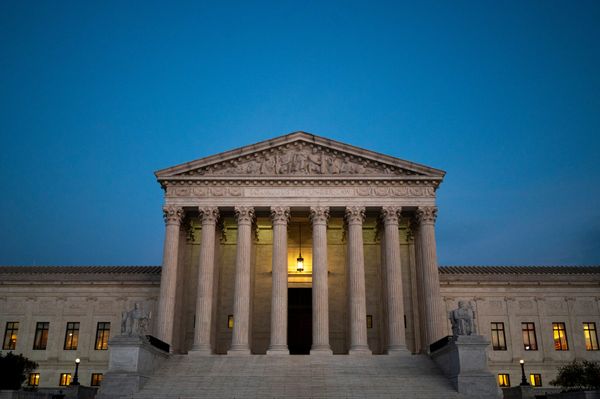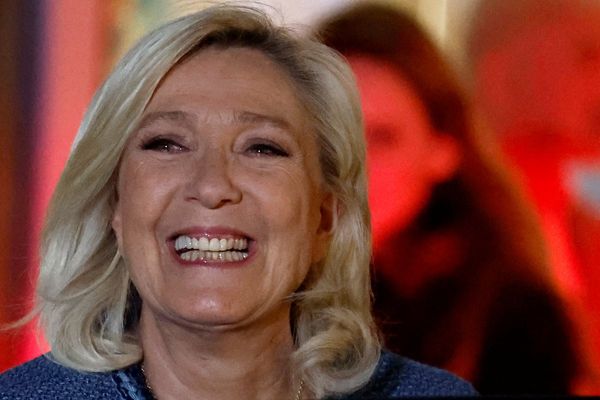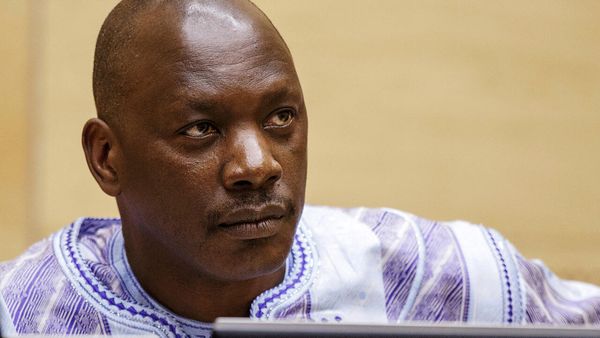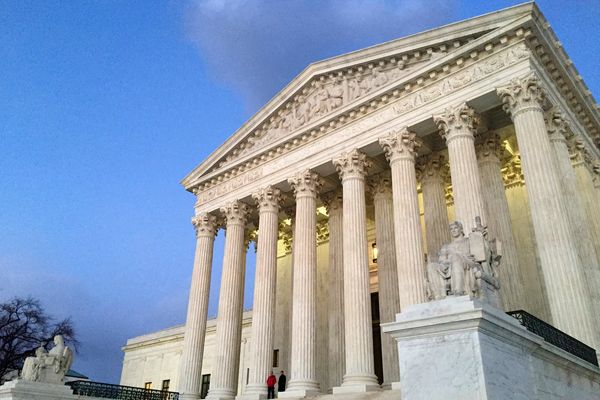Donald Trump on Tuesday pleaded not guilty to 34 felony charges of falsifying business records in what prosecutors alleged was a conspiracy to influence the 2016 presidential election by silencing claims of extramarital affairs, marking the first time in American history a former president has been charged with a crime.
Trump arrived ashen-faced and visibly angry for his arraignment in Manhattan criminal court, stopping to wave to supporters, reporters and onlookers.
Once inside, Trump, like any other criminal defendant, was fingerprinted in custody. But he was also afforded special accommodations: he was not handcuffed and was not subject to a mugshot.
Wearing his signature dark navy suit and red tie, Trump entered the courtroom with two Secret Service agents and two New York courts officers, and proceeded with his jaw tightly locked towards his legal team. The former president had strategized for weeks about how he wanted to appear defiant, but once in the courtroom without television cameras or photographers except at the very start, he mainly appeared infuriated.
In his appearance before the New York supreme court justice Juan Merchan, Trump said little, speaking only to say “not guilty” to the 34 charges, and to sigh “I know” when Merchan warned he could be removed for being disruptive. It was a tense and surreal moment for the former president, who could face trial in spring 2024, right in the middle of the presidential primary as he seeks to recapture the White House.
In a 13-page statement of facts, the district attorney accused Trump of having “orchestrated a scheme” with the intent “to influence the 2016 presidential election by identifying and purchasing negative information about him to suppress its publication and benefit the defendant’s electoral prospects”.
The charges stem from payments made to the adult film star Stormy Daniels, who said she had a sexual encounter with Trump in 2006, as well as to a Playboy model, Karen McDougal, who wanted to sell her story of an affair with Trump, and a former Trump Tower doorman, who claimed Trump fathered a child out of wedlock.
Trump has denied the sexual encounters and any wrongdoing, casting himself as the victim of a political “witch-hunt”.
“We today uphold our solemn responsibility to ensure that everyone stands equal before the law,” the Manhattan district attorney, Alvin Bragg, told reporters. “No amount of money, no amount of power changes that enduring American principle.”
Bragg forcefully defended the case, arguing that falsifying business records was the “bread and butter” of white-collar investigations and that “true and accurate business records” were important in Manhattan, the “financial capital of the world”.
According to prosecutors, Daniels was paid $130,000 by Trump’s then lawyer, Michael Cohen, in the final days of the 2016 campaign. Cohen said the payments were made at the direction of Trump, who reimbursed him while president. Those payments, through Trump’s company, were falsely classified as legal expenses, prosecutors say.
In 2018, Cohen pleaded guilty to federal crimes including the hush money payment and was sentenced to three years in prison, which Trump’s legal team has used to undermine his credibility.

Separately, prosecutors say, the parent company of the National Enquirer, American Media, arranged two “catch and kill” deals to squash stories that could damage Trump. One involved $30,000 to the former doorman. The tabloid reached a $150,000 agreement with McDougal, purchasing her story to keep it from going public.
Prosecutors said such stories could have undermined Trump’s campaign. And they asked for protective orders for discovery materials, including Trump’s escalatory posts on his Truth Social platform, such as when he vowed “death and destruction” if he was indicted.
In a combative exchange with reporters, Trump’s lawyers defended their client.
“Today’s unsealing of this indictment shows that the rule of law died in this country,” said Joe Tacopina, adding: “If this man’s name was not Donald J Trump, there is no scenario we’d all be here today.”
Asked to describe Trump’s outlook, Todd Blanche shot back: “What do you think his reaction was? He is frustrated and upset.”
It is a politically and legally perilous moment for Trump and also for the US, as a twice-impeached, criminally charged former president runs for re-election.

Intense public interest was underscored by dueling but peaceful demonstrations in a park near the courthouse. Barricades divided Trump supporters from opponents, a stark visual of a nation deeply divided. While a conviction is far from certain, it would not preclude the former president from running or winning the presidency in 2024.
The New York case is just one of an array of legal threats. Trump faces criminal investigations over the January 6 Capitol attack, his retention of classified documents and his efforts to overturn the 2020 election in Georgia, as well as civil inquiries into his business and a defamation suit arising from an allegation of rape.
Joe Biden, who has yet to formally announce a re-election campaign, has declined to comment on the New York case.
“This is not his focus for today,” Biden’s press secretary, Karine Jean-Pierre, told reporters on Tuesday.
Trump left the courthouse for LaGuardia airport, where his jet waited to fly back to Mar-a-Lago. After arriving at his Florida mansion, Trump gave a speech in front of his family and supporters.
The former president railed against his enemies, from Biden to the FBI to Bragg, in remarks filled with conspiracy theories and lies about the election he continues to falsely claim was stolen.
In 25 minutes, a short speech by Trump’s standards, he repeated numerous falsehoods about investigations against him and made baseless claims of corruption against the Biden family.
Several media outlets refused to air the remarks. On MSNBC, Rachel Maddow argued that Trump was merely “repeating his same lies”.
“We don’t consider that necessarily newsworthy and there is a cost to us as a news organization of knowingly broadcasting untrue things,” Maddow said.
Trump’s next court date in the New York case is set for 4 December, just two months before the Iowa caucuses.







